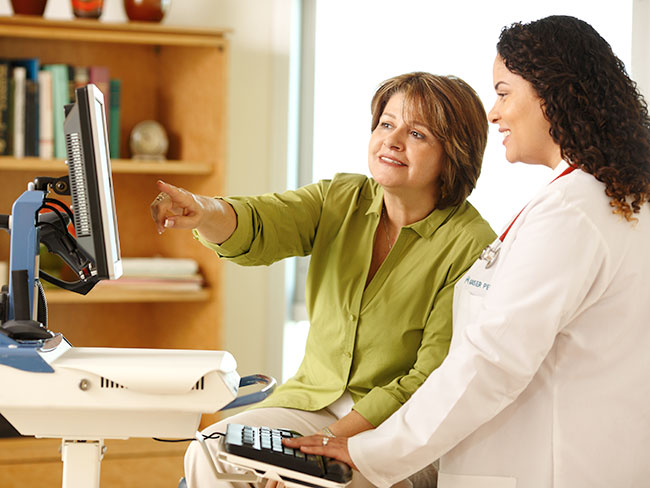Cutting-edge Kaiser Permanente research is giving patients hope
Clinical trials like an endometriosis study could offer answers to underdiagnosed conditions.
Researchers Matthew Applesmith and Jen McCance, who work on the study with Drs. Bastow and Ellis, load frozen samples for analysis.
For decades, ob-gyns like Toya Ellis, MD, and Brittney Bastow, MD, had a frustrating challenge on their hands.
Women came to doctor’s appointments with symptoms like pain, bleeding, or trouble getting pregnant. Together, those symptoms can indicate endometriosis — a condition in which cells similar to the uterine lining grow outside the uterus. The cells can grow in clumps on other organs throughout the belly where they don’t belong.
“The problem is that there hasn’t been a good way to confirm it’s endometriosis without visually confirming it through surgery,” said Dr. Ellis. “But without that surgery, many of these women are left managing a painful condition that can really take away from their quality of life.”
And due to challenges in diagnosing the condition, Dr. Bastow said, endometriosis is easy to miss. That can leave patients frustrated and without answers for their pain.
It also means no one truly knows how common endometriosis is.
All of that could soon change, thanks in part to recent work by Kaiser Permanente researchers.
Through Institute for Health Research, or IHR, at Kaiser Permanente in Colorado, Drs. Ellis and Bastow have been enrolling Kaiser Permanente patients in a type of research called a clinical trial.
Clinical trials test a medical product — a blood test in this case — to see if it can improve treatments. The test is designed to flag if women have signs of endometriosis in their blood. For now, a positive test would then be confirmed through surgery.
But in the future, it could help patients catch endometriosis early and avoid its worst impacts, including surgery.
Expanding the impact of clinical trials
Supported by the IHR clinical trials team, dozens of Kaiser Permanente physicians in Colorado were working on 65 active clinical trials at the end of 2024.
The studies looked at cancer treatments, medical devices, and more.
Typically, a physician treating a patient with a condition that’s being studied by researchers lets the patient know about an opportunity to enroll in a clinical trial.
“These kinds of trials have given our patients access to cutting-edge treatments,” said Stacie Daugherty, MD, a cardiologist and medical director of IHR’s clinical trials program for Kaiser Permanente in Colorado. “Our team is proud to lead these clinical trials, which help advance our understanding of how to improve care and the health of our members.”
Through a growing network of relationships with industry and other research institutions, IHR has expanded its reputation for clinical trials in recent years. This has led to more opportunities for clinical trials related to cancer, heart health, the digestive system, and more.
Hope for future endometriosis patients
If the endometriosis blood tests work, Drs. Ellis and Bastow hope similar tests could become more available.
“If women, or even girls entering puberty, had access to a test like this, it could alert them to potential endometriosis much sooner in life,” said Dr. Bastow. “That could mean earlier treatment that would save women from years of pain, and it could potentially preserve their ability to get pregnant.”
While results like those could be years away, clinical trials like this one are still advancing knowledge for the next generation of care teams and their patients.
“That is why we do this work,” said Dr. Ellis. “We’re finding answers that will help people live their best lives.”




